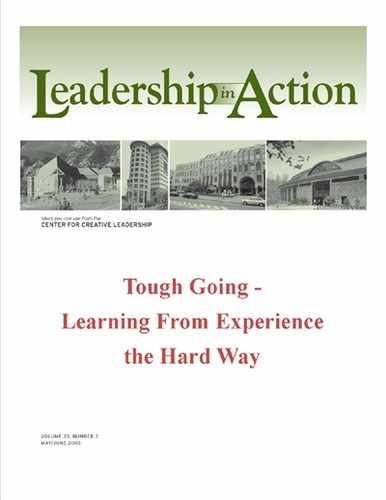Downsizing
Sometimes events conspire. No matter how hard and well some people have worked to develop their capacities as leaders and no matter how hard they have tried to meet the company's expectations and how loyal they have been, there are times when they fall victim to corporate downsizing. They lose their jobs through no fault of their own, but even knowing that does not diminish their sense of loss.
Because people often identify themselves with the work they do, there is first and foremost a loss of identity. This is compounded by losses of relationships, community, and security. As with other hardships, leaders who experience downsizing need an opportunity to work through their fear, insecurity, frustration, anger, sadness, and distrust.
Yet most organizations and the people in them are not prepared to help people work though the healing process after a downsizing. As David Noer points out in his book Healing the Wounds: Overcoming the Trauma of Layoffs and Revitalizing Downsized
Most organizations are not prepared to help people work through the healing process after a downsizing.
Organizations (Jossey-Bass, 1993), downsizings are done from the heads, not the hearts, of the organization's executives. Although some downsized individuals seek out professional counseling and others rely on support systems outside work to help them sort out their feelings, most don't find the kind of support they need inside their organization.
If support is available, either inside or outside the company, powerful lessons can be learned. People can learn that they have the ability to cope with things that are beyond their control. One executive said of his experience of downsizing:
I learned that nothing is guaranteed. I decided to take advantage of every opportunity to maximize my marketability. I also learned not to be overwhelmed with anxiety, especially in situations where I have little or no control.
Being downsized is one kind of hardship; being responsible for a downsizing is another. A district operations manager said:
Because of a reduction in the number of districts in our company, some 250 people were being displaced or laid off. I had the unpleasant duty of telling people how this reorganization affected people in my district. The hardest task was telling this one manager he was being laid off. He took the news extremely hard. I was not prepared for his reaction—he cried.
People should accept the idea that during the course of their careers and their lives, hardships will happen.
What did the manager learn from the experience?
It awakened me to the real world of management in dealing with people. I became more compassionate and gained more understanding of people's feelings. I think it made me stronger and better equipped to handle difficult situations when managing people.
Racial Injustice
The final hardship involves situations or interactions in which a manager experiences or observes an injustice resulting from racial prejudice or discrimination.
The sense of loss that results from such injustices is felt deeply and personally. Sometimes it is a loss of self-esteem or self-respect. At other times it is a loss of a sense of connectedness. And too often this hardship leads to a loss of a sense of self; identity is suffocated by the experience of injustice.
